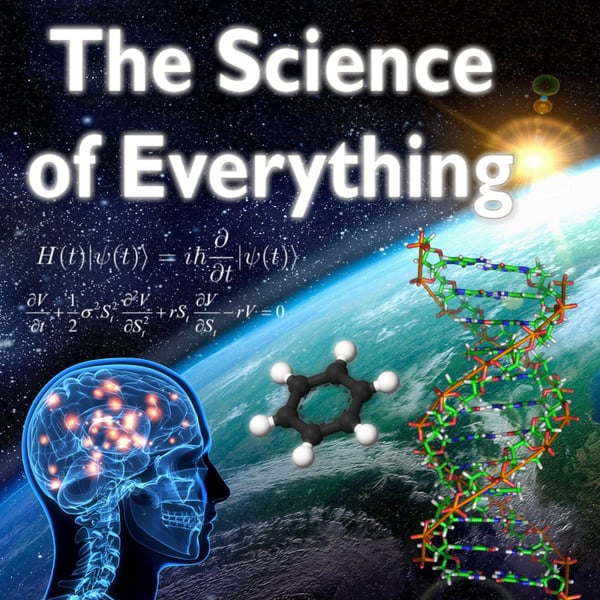Episode 138: Biochemistry and Metabolism
The Science of Everything Podcast
James Fodor
4.8 • 750 Ratings
🗓️ 31 August 2023
⏱️ 59 minutes
🧾️ Download transcript
Summary
Transcript
Click on a timestamp to play from that location
| 0:00.0 | Oh, wow, oh, oh, wow, oh, wow, oh, wow. |
| 0:13.0 | Oh, wow. |
| 0:15.0 | Oh, my. Hello, you're listening to the Science of Everything podcast, episode 138, biochemistry and metabolism. |
| 0:41.7 | I'm your host, James Fodor. |
| 0:43.3 | So in this episode, we're going to discuss biochemistry and human metabolism. |
| 0:48.1 | And as part of that, we're going to look at the three major macromolecules or types of nutrients that are metabolized in the human body, |
| 0:56.6 | proteins, carbohydrates, and lipids. |
| 0:59.2 | Recommended pre-listening for this episode is episode 18, biochemistry basics, as well as episode 75 on cellular respiration. |
| 1:07.2 | We build on some of the material developed there, so I strongly recommend you check those out before |
| 1:11.2 | listening to this one. What we're going to talk about in this episode, as I've said, are the three |
| 1:15.6 | major macronutrient molecules, and in particular we're going to discuss how each of them |
| 1:20.4 | is broken down into smaller constituents, and then how each of them can be built up again |
| 1:25.3 | to form new versions of proteins and carbohydrates and lipids that are needed throughout the body. |
| 1:30.3 | So these two types of processes are known as catabolic and anabolic. So catabolic is breaking down and anabolic is building up. |
| 1:38.3 | And we'll look at each of those processes for each of our three major types of macromolecules. |
| 1:44.5 | So let's get started by first giving a quick introduction to what metabolism is |
| 1:48.5 | before we go through all of the three different types of molecules. |
| 1:51.5 | So metabolism is the set of chemical reactions that occurs in organisms that sustains life. |
| 1:57.5 | So the three main functions of metabolism are converting energy from food into a form that's |
| 2:02.9 | available to run cellular processes, converting food to building blocks for structural and functional |
| 2:09.4 | components of the body. So those are proteins, lipids, and nucleic acids and so forth. And finally, |
| 2:14.2 | eliminating metabolic wastes. I'll talk about eliminating wastes in a different episode. |
... |
Please login to see the full transcript.
Disclaimer: The podcast and artwork embedded on this page are from James Fodor, and are the property of its owner and not affiliated with or endorsed by Tapesearch.
Generated transcripts are the property of James Fodor and are distributed freely under the Fair Use doctrine. Transcripts generated by Tapesearch are not guaranteed to be accurate.
Copyright © Tapesearch 2025.

